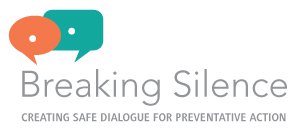By Alli Watt, Guest Blogger & Executive Director of Breaking Silence
The stories of survivors of sexual assault have been hitting the media with a force that has never been seen before. It is empowering to see the amount of attention this issue is receiving. More than ever, women and men have a platform to step onto and share their experience. Their strength is teaching our society two very significant lessons: that we must start believing that what happened to them was not their fault and that more times than not, they are telling the truth. These are two realities that we are still struggling to accept. Bringing an end to victim blaming, sexual assault and domestic violence on college campuses is a process that will take many years, and a mission that Breaking Silence is committed to seeing to fruition.
Breaking Silence is a project of the Colorado Nonprofit Development Center, a registered 501(c)3 nonprofit, that engages and inspires communities to take action and recognize their responsibility for the impact interpersonal violence (IPV) has on our culture. The organization is committed to promoting empathy, healing, and open dialogue through a traveling interactive exhibit in which the stories of survivors are brought to life with chilling realism. The exhibit allows college students to walk in the shoes of survivors, teaches them the truth about consent, and how to step in when someone may be harmed. By launching an Indiegogo Campaign, our grassroots organization will be able to enhance the exhibit, provide further support to survivors, start the conversation to end the violence on college campuses.
The impact of the exhibit rests on the engagement of students after they have walked through. They often have questions about consent, how they can change the culture on their campus and wondering how they can prevent these crimes from happening in the future. Every student has the opportunity to reflect on our ‘reflection wall’ and connect with support systems such as advocacy and therapy centers, and health clinics.
Breaking Silence focuses on college campuses due to the fact that this is where the majority of these crimes take place. The CDC has estimated that 1 in 5 women will be sexually assaulted between the ages of 19-24. We must start teaching young people how to handle the many life transitions that are coming their way during this time. In order to make a permanent and lasting change on campuses, we specialize our trainings to be geared towards athletic departments, freshmen orientations, and Greek life.
Lately, there has been a lot of media coverage on the failures of campuses to handle sexual assault cases properly. It has happened time and again that when the offender is, for example Jameis Winston, the quarterback for FSU, the media turns not on the man that harmed, but on the person that had been harmed. Reporters pegged his victim as a liar, as another woman looking for attention and who tried to destroy the life of another athlete with so much potential. They looked at her as nothing more than a ‘typical’ survivor who falsely reported a sexual assault. Even though we know that people very rarely false report, we do not seem to find it strange that when a person is high profile, we often find them innocent and place the blame for all of the mess on the victim.
Although we are taking steps to end this victim blaming, we still have a long way to go. Reporting a sexual assault is a long and difficult process. If you add in the fact that you may not believed or that your peers could turn on you and label you as a ‘slut,’ ‘whore,’ or ‘liar’ or that your case could possibly hit the cover of the New York Times, would you tell? Those that report are not only being silenced, they are being victimized over and over again. Reporting has become another version of trauma. If we want to see the number of people who are victimized go down, then we must change the way that we respond to survivors. We have to stop believing that victims are making these stories up for sport. No amount of attention is worth what these people have had to go through. Survivors need to know that the world is on their side, not on their offenders. When Jameis Winston walked out onto the field during the Rose Bowl, the message that was sent was pretty clear: We currently care more about football and fame than we do about supporting survivors.
It is going to take time to change the culture on college campuses, and that is something that we work everyday to do. But there is something that we can do now. Imagine the amount of support survivors would feel if a football team walked out wearing “I Believe You” shirts or “Yes Means Yes” eye black. It is simple, yet it would get the world talking about something powerful instead of something devastating. It will give the power back to survivors and allow for people to see that teams, campuses, players, people, and society believe their story. It would be a moment where their words will matter and they will know that they will not be silenced anymore. These men that have the ear of the media, that have the power to motivate their peers, that have the power to say I will take care of her when she is too drunk, can stand up and be the ones that start a conversation that must be heard on every campus across this nation. We must start with “I Believe You’ if we wish to end sexual assault and victim blaming.
If you believe in creating this change, help us reach our fundraising goal by clicking here, so we can teach students how to be advocates for survivors, how to say “I Believe You” and learn what consent means. Breaking Silence has recently launched an “I Believe You” Campaign and we need your support in getting the word out on what we do and the impact that our organization has on campuses.
[1]Wetzel, Dan. “Ugly Treatment of Jameis Winston’s accuser serves to only discourage future victims.” October 15, 2014. http://sports.yahoo.com/news/ugly-treatment-of-jameis-winston-s-accuser-only-serves-to-discourage-future-victims-034943507-ncaaf.html
[1]NDAA, “False Reports: Moving Beyond the Issue to Successfully Investigate and Prosecute Non-Stranger Sexual Assault. http://www.ndaa.org/pdf/the_voice_vol_3_no_1_2009.pdf

